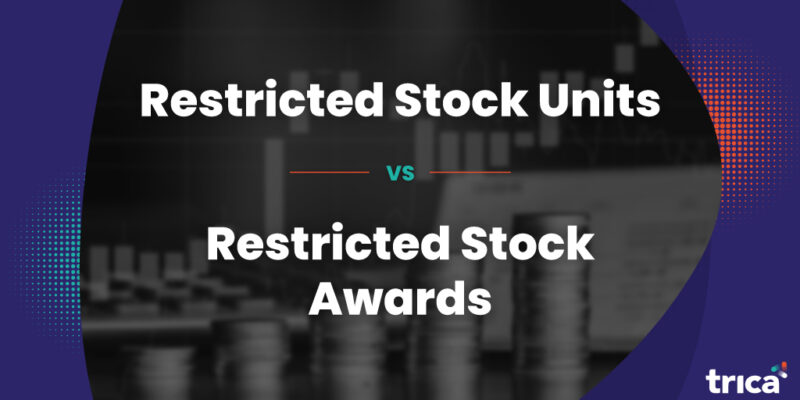
Restricted Stock Units vs Restricted Stock Awards: Key Differences
As the number of startups rises, the competition to attract and retain talent is also growing. Companies offering higher compensation are at an advantage. However, employees are also looking for benefits that extend beyond mere numbers. For instance, they may be seeking deeper involvement in the business. Equity compensation can pave the way for employees to become stakeholders in the company’s growth trajectory, sustainability, and profitability. Companies leverage equity compensation, such as Restricted Stock Units (RSUs), to fight attrition and enhance employee lifetime value.
In this blog, we explain the basics of Restricted Stock Units, and how it differs from Restricted Stock Awards, another popular equity compensation option that startups offer.
Simplifying Restricted Stock Units
As a company grows and becomes successful, the value of its stock rises, making it expensive for employees to purchase it at the market price. Granting Restricted Stock Units enables companies to leverage company stock to retain good employees, albeit with a unique approach.
When a company grants RSUs to an employee, the employee is entitled to acquire a fixed number of shares upon meeting specific, predetermined conditions. Employees need not purchase the shares as they are issued as bonuses or compensation, once the vesting period is complete. These shares are taxable like regular income.
When offering RSUs, the agreement must clearly outline details such as the vesting schedule and/or milestones to be achieved by the employee to become eligible to acquire the shares. (The vesting schedule is the time frame that must pass before the employee acquires the stock.) For example, they may need to stay with the company for the next two years or achieve a specific target.
The value of each share is fixed at the fair market value, which is arrived at by a professional 409A valuation. This makes it a win-win for the company and the employee, as the company grants it at a rational price, while the employee gets access to company stock without needing to purchase it.
In a nutshell, successfully vested Restricted Stock Units can be considered a bonus paid to an employee in the form of the company’s stock. Hence, it is a viable tool to incentivize employees through stock ownership.
What Are Restricted Stock Awards (RSAs)?
Restricted Stock Awards are typically granted in the very early stages of the company’s growth and used as a key retention strategy tool.
Employees must purchase the shares at the fair market value, which is typically low. Though the employee owns the stock, the company can repurchase the stock if the employee doesn’t meet the vesting period conditions.
Differences: Restricted Stock Units vs Restricted Stock Awards
Though Restricted Stock Units and Restricted Stock Awards have similarities, they differ in terms of context and mechanism. Here is a snapshot of their key differences:
1. Growth Stage of the Business
Restricted Stock Units are granted by companies at a mature growth stage, while Restricted Stock Awards are issued early.
Since mature companies are more established and profitable, the stakes are higher when they grant RSUs, and this is because the stock is a much more coveted asset at this time.
2. Purchase Price
Employees do not need to purchase RSUs; they receive them as bonuses. But RSAs have to be purchased.
3. Fair Market Value
The fair market value of RSUs tends to be higher than that of RSAs because of the business’s growth stage.
4. Stocks Issue
In the case of RSUs, stocks are issued on meeting the vesting conditions. In the case of RSAs, stocks are issued immediately. However, repurchase rights remain with the company for RSAs.
5. Application of 83 (B)
An 83 (B) election does not apply for RSUs, as the stocks are not granted until the vesting period is complete. However, employees granted RSAs have the option of pre-paying the tax via an 83 (B) election, which is beneficial in curbing taxes if the value of the shares increases considerably in the future.
6. Termination rules
If an employee is terminated before the vesting period, the RSUs are forfeited while in RSA, the shares are repurchased by the company.
In both cases, when the stocks have successfully vested, the ownership of stocks is transferred to the employees. The profits are taxed as capital gains if and when the employee chooses to sell them in the future.
The Takeaway
Restricted Stock Units and Restricted Stock Awards are mechanisms for startups to attract and retain valuable employees. The relevance of each varies based on the growth stage, employees’ performance and the stock’s value. The decision to incentivize employees via stock ownership must be strategic. Startups should maintain a long-term perspective and seek professional counsel when crafting their strategy.
trica is a state-of-the-art stock options management tool leveraged by startups to build a superior experience when issuing stock options programs. Book a demo today to know more!
ESOP & CAP Table
Management simplified
Get started for free





